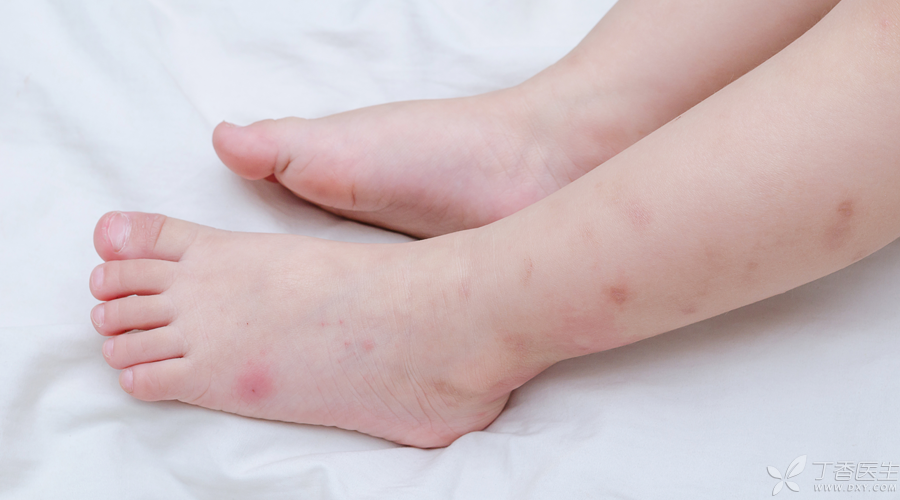
Babies often have a bag here today and a small pimple there tomorrow. Some are itchy, some are red, and some seem to feel nothing.
What are these bags that the baby grows?
Today, Dr. Yu Jia from the dermatology department was invited to help us answer our questions.
Mosquito bag
It’s getting hot, mosquitoes are everywhere, and babies will inevitably suffer.
Generally speaking, two kinds of mosquito bags often appear on babies.
The first type: ordinary mosquito bag
Generally, after being bitten by mosquitoes, a small skin color or reddish bulge bag will soon appear on the skin, which is very itchy at that time and will mostly subside after half an hour or an hour, which is called wind mass.
What should I do?
This mosquito bag can be left untreated, and it can be cold applied with a towel for a while when it itches at most.
The second type: delayed mosquito bag (also called papular urticaria)
This mosquito bag usually lasts for a long time, for example, 2-7 days, and some will become red, swollen and enlarged in the previous few days, even appearing hard pimples and small blisters. Most of them are itchy and look a little scary.
At this time, many mothers will smear some mosquito-bitten care products or toilet water on their babies, and some will smear white vinegar and salt water. In fact, these practices are not only ineffective, but may even partially lead to aggravation of rash.
What should I do?
You can apply some hormone ointment under the guidance of a professional doctor, which can take effect in 2-3 days.
Of course, the best prevention and control method is to do all kinds of mosquito repellent and mosquito prevention measures for the baby, such as smearing some mosquito repellent water on the exposed small arms and legs of the baby to prevent accidents before they occur.
Prickly heat
It’s hot, the baby sweats a lot and has more prickly heat.
Often said prickly heat, in fact, is after the baby sweats a lot, the skin appears many sparkling blisters or flaky erythema hillock herpes.
What should I do?
If prickly heat has already developed, most of the time you can leave your baby in a cool place for a few days without drugs. Most of these bubbles or rashes can be absorbed and subsided by yourself. Some will peel off in the later period, so it is good to pay attention to local moisturizing and moisturizing during peeling. If pustules occur, seek medical treatment as soon as possible.
It is not recommended to smear too much powder on the baby after prickly heat. First, it is not convenient to observe rash changes. Second, although powder can promote blister absorption in the early stage, it will lead to excessive dryness of skin and induce pruritus in the later stage.
If there is no prickly heat, when the baby is found to be sweating too much, try to reduce the temperature in the room, change clothes for the baby in time, and try to choose close-fitting clothes with good air permeability and water absorption.
Eczema
Eczema can occur almost every season.
Eczema in summer is often related to local heat, sun exposure, excessive cleaning and insufficient moisture retention. However, due to the humid climate in many places in summer, the incidence rate of eczema is relatively low.
What should I do?
If the baby’s face and body injuries have large erythema, small red envelopes, yellow water, etc., parents are advised to take them to the hospital for doctors to judge the condition and carry out appropriate treatment.
In life, avoid keeping your baby in a too hot environment, avoid sun exposure and clothing friction, choose refreshing and breathable clothes for your baby to wear, and pay attention to moisturizing, all of which can effectively reduce the onset of eczema.
Urticaria
Urticaria looks a bit like mosquito bags and is easily confused.
However, mosquito bags usually subside quickly, while urticaria will recur and itch. Sometimes the baby will feel itchy continuously before even seeing the rash attack.
What should I do?
If urticaria attacks, you can immediately use a cold towel to apply cold compress to the baby at the place where the rash occurs. It is good to apply it for a few minutes, which can not only help relieve itching, but also promote vasoconstriction and help the rash recover.
Do not apply cold for too long, and do not continue to apply ice in the same place to avoid frostbite.
If a large number of rashes throughout the body recur and always feel itchy, the baby scratches badly, the cold compress effect is not good, or the baby obviously has throat discomfort, breathing is affected, and even sleep is affected, it is recommended to see a doctor immediately to avoid laryngeal edema and other dangerous situations.
In addition, if the baby has recurrent attacks of suspected urticaria, it is necessary to think about whether he has recently come into contact with obvious allergenic factors in what, such as colds, diarrhea-related infections, special oral drugs, seafood or foods rarely eaten at ordinary times, more dust and pollen, etc. If so, he must try his best to avoid them.
After reading today’s article, are parents more confident about the baby’s bag?
Of course, it is not to say that with today’s article, parents can see the baby by themselves, but to hope that after the baby has problems, parents can also have basic judgment and nursing awareness.
In short, those who can handle it by themselves, properly handle it, and those who do not understand it must go to the hospital. We can’t use drugs indiscriminately as soon as we are in a hurry. As a result, we have done bad things with good intentions.
